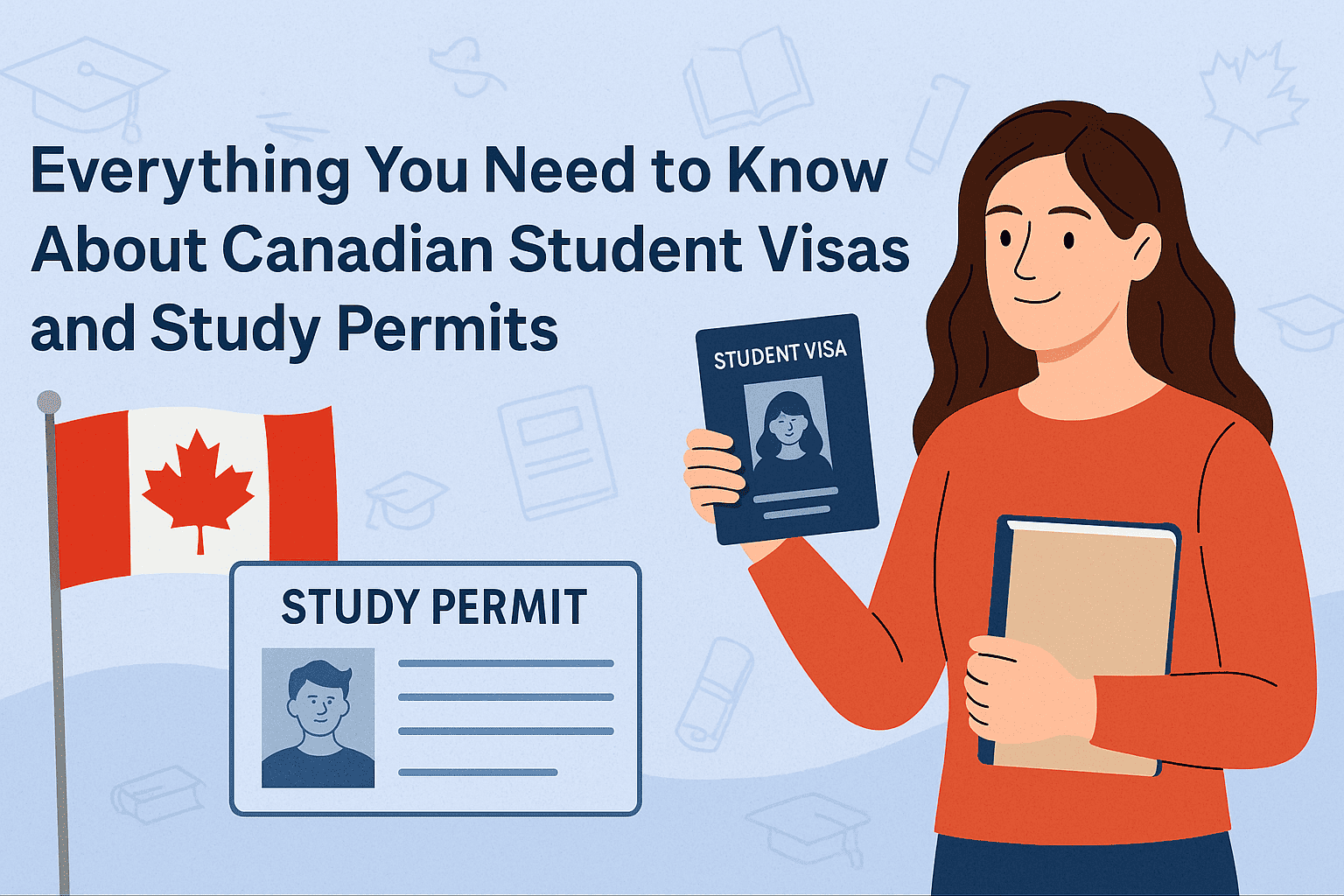Studying in Canada is a dream for countless international students, thanks to its world-class education system and multicultural environment. However, to make this dream a reality, understanding Canada’s student visa and study permit system is crucial. With many rules, requirements, and processes to follow, navigating the application can seem overwhelming. That’s where this guide comes in.
Below, we’ll break down everything you need to know about Canadian student visas and study permits—what they are, how to apply, and tips for success.
According to the Ontario Ministry of Education, learning skills are evaluated separately from subject grades
Read More About Study in Canada For International Students (2025)
What’s the Difference Between Canadian Student Visas and a Study Permit?
One of the first steps toward studying in Canada is understanding the difference between a student visa and a study permit—terms often used interchangeably, but they are distinctly different.
Study Permit
A study permit is the document that allows you to study at a designated learning institution (DLI) in Canada. It is not a visa but a permit to remain in Canada for academic purposes.
- Grants permission to stay in Canada for the duration of your program.
- May include conditions, such as restrictions on off-campus work hours.
Student Visa
A student visa refers to the visa issued for entry into Canada as a student. If you’re from a visa-required country, you’ll need a Temporary Resident Visa (TRV) in addition to your study permit.
- Allows entry into Canada.
- Often issued automatically alongside the study permit approval for eligible students.
Do You Always Need Both?
Yes, in most cases. If you are from a visa-exempt country like the U.S., you won’t need a visa but will require an electronic Travel Authorization (eTA). However, all international students require a valid study permit to enroll in a long-term academic program.
Eligibility Requirements for a Study Permit
Before you begin the application process, it’s essential to know whether you’re eligible for a study permit. Below are the main requirements:
- Acceptance Letter : You must have a letter of acceptance from a Designated Learning Institution (DLI) in Canada.
- Proof of Financial Support : Demonstrate that you can cover your tuition, living expenses, and return travel costs. Minimum financial requirements vary but typically include:
- CAD $10,000 per year for living expenses (outside Quebec).
- CAD $11,000 per year for living in Quebec.
- Clean Criminal Record : You may need to provide police clearance certificates proving no criminal history.
- Good Health : A medical exam is required for applicants from certain countries or those planning to stay for more than six months.
- Intent to Leave Canada : You must prove that you intend to leave Canada after completing your studies.
Meeting these requirements is key to having your application approved.
How to Apply for a Canadian Study Permit
The application process for a Canadian study permit involves several steps. Follow this step-by-step guide to ensure you meet all the requirements:
Step 1: Get Your Acceptance Letter
Apply to a Designated Learning Institution (DLI) and secure an official acceptance letter. Ensure the program and institution appear on the DLI list provided by Immigration, Refugees, and Citizenship Canada (IRCC).
Step 2: Gather Required Documents
Prepare all necessary documents, including:
- A valid passport.
- Letter of acceptance from a DLI.
- Proof of financial support (e.g., bank statements, scholarship letters).
- Photographs meeting government specifications.
- Additional documents like medical exam results or police certificates, if applicable.
Step 3: Complete the Online Application
- Visit the IRCC website to create an account and submit the study permit application.
- Pay the application fee, currently CAD $150.
Step 4: Biometrics Appointment
After submitting your application, you’ll receive instructions for providing biometrics (fingerprints and photos). Fees for this service are CAD $85.
Step 5: Wait for Processing:
Once everything is submitted, the application will be reviewed. Processing times range from 4 to 20 weeks, depending on your country of residence.
Step 6: Receive Your Approval Letter
If approved, you’ll receive a Port of Entry (POE) Letter of Introduction. Keep this with you when traveling to Canada. Upon arrival, the border officer will issue your official study permit.
Tips for a Successful Application
Applying for a study permit can sometimes be tricky, but these tips will help improve your chances of success:
- Double-Check Documents : Ensure all documents are complete and meet the IRCC requirements. Minor errors can lead to application delays or rejection.
- Start Early : Begin the process months in advance to account for processing times and any unexpected delays.
- Provide Clear Financial Evidence : Vague or insufficient proof of funds is one of the main reasons for rejections. Show detailed and credible financial documents.
- Stay Honest : Misrepresentation of information can lead to denial and future bans from entering Canada.
- Make Use of the Student Direct Stream (SDS) : If you’re from specific countries like India or China, you may qualify for SDS—a fast-track application process if you meet additional criteria.
Overcoming Common Challenges
Many applicants face roadblocks during the study permit process. Here’s how to address them:
Delayed Processing Times
- Submit your application well before the deadline.
- Check the IRCC website frequently for status updates.
Rejection Due to Insufficient Funds
- Provide detailed financial statements for 4–6 months prior to your application.
- Include sponsor letters (if applicable) with full details of your benefactor.
Visa Officer Concerns About Intent :
- Write a strong Statement of Purpose explaining why you’re choosing Canada and your plans after graduation.
Language Barriers
- If you’re nervous about English proficiency, consider taking formal language assessments like IELTS or TOEFL. Higher scores make a positive impression.
What Happens After Approval?
Receiving a study permit is a huge relief, but there are conditions you’ll need to meet once in Canada. Ensure you:
- Maintain Enrollment at a DLI and make progress toward program completion.
- Work Within Limits, if applicable. Your study permit may offer work authorization for up to 20 hours per week during academic sessions.
- Renew Your Permit as needed. Apply for an extension well before your permit’s expiration date if your program runs longer.
Final Thoughts
Getting a Canadian study permit is a crucial step on your path to studying in Canada. While the process can be complex, understanding the key requirements, planning ahead, and putting together a thorough application will set you up for success.
Whether you’re just starting your research or preparing to apply, this guide has everything you need to feel confident in navigating the process. Remember, Canada is home to incredible educational opportunities, and your study permit is the first step toward unlocking them. Good luck with your application!
Contact Information – USCA Academy
Address: Unit 2, 977 Pantera Drive, Mississauga, ON L4W 2W6, Canada
Phone: +1 (905) 232-0411Email: info@uscaacademy.com









